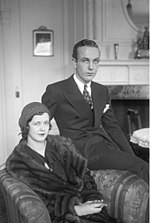William Randolph Hearst Jr., Date of Birth, Place of Birth, Date of Death
TweetWilliam Randolph Hearst Jr.
American newspaper editor
 Date of Birth: 27-Jan-1908
Date of Birth: 27-Jan-1908
 Place of Birth: Manhattan, New York, United States
Place of Birth: Manhattan, New York, United States
Date of Death: 14-May-1993
Profession: socialite, journalist
Nationality: United States
Zodiac Sign: Aquarius 
About William Randolph Hearst Jr.
- William Randolph Hearst Jr.
- (January 27, 1908 – May 14, 1993) was an American businessman and newspaper publisher.
- He was the second son of the publisher William Randolph Hearst.
- He became editor-in-chief of Hearst Newspapers after the death of his father in 1951.
- He won a Pulitzer Prize for his interview with Soviet premier, Nikita Khrushchev, and associated commentaries in 1955. Hearst attended the University of California, Berkeley and was a member of the Phi Delta Theta Fraternity. Hearst was instrumental in restoring some measure of family control to the Hearst Corporation, which under his father's will is (and will continue to be while any grandchild alive at William Randolph Hearst Sr.'s death in 1951 is still living) controlled by a board of thirteen trustees, five from the Hearst family and eight Hearst executives.
- When tax laws changed to prevent the foundations his father had established from continuing to own the corporation, he arranged for the family trust (with the same trustees) to buy the shares and for longtime chief executive Richard E.
- Berlin, who was going senile, to be eased out to become chairman of the trustees for a period.
- Later, William Randolph Hearst Jr.
- himself headed the trust and served as chairman of the executive committee of the corporation.
- Today, his branch of the family is represented on the trustees by his son, William Randolph Hearst III. Hearst was a member of the Sons of the American Revolution.
- He makes a brief appearance in the musical adaptation of Newsies as Bill.
Read more at Wikipedia
See Also
- Famous People's Birthdays on 27 January, United States
- Famous People's Birthdays in January, United States
- Famous socialite's Birthdays on 27 January, United States
- Famous socialite's Birthdays in January, United States
- Famous journalist's Birthdays on 27 January, United States
- Famous journalist's Birthdays in January, United States


